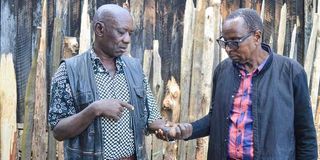Pyrethrum retirees lament futile wait for pension cash

Mr Ferdinand Kisiangani Wanjala (left), a member of the insolvent Pyrethrum Board of Kenya Staff Superannuation Scheme, shows fellow pensioner Harun Tinga (right) one of his paralysed hands at his home in Njoro, Nakuru County, late last month.
If there is one leader who knows the ins and outs of the tribulations facing Pyrethrum Processing Company of Kenya (PPCK) pensioners, it is President William Ruto.
In 2009, Dr Ruto, then the Minister for Agriculture, issued a ministerial statement in Parliament while answering a question from former Ndaragwa MP Jeremiah Kioni about why the government sacked hundreds of workers at the Pyrethrum Board of Kenya (PBK), which later transitioned to PPCK.
He said the workers were sacked as part of plans to revive the ailing sector.
Now, the layoffs that Dr Ruto initiated 14 years ago are coming back to haunt him. The frustrated pensioners are demanding the sale of 13 non-core assets spread across Nakuru City to settle their pending dues amounting to more than Sh2 billion.
They are also hoping that Chief of Staff and Head of Public Service Felix Koskei, himself a former Cabinet Secretary for Agriculture, will push their agenda.
“Mr Koskei was the CS Agriculture. We have faith in him to end our miseries,” said their spokesman, Mr Harun Tinga.
Last year PPCK Board chairperson George Wachira said they had written to the National Treasury seeking permission to sell houses and land in prime areas of Nakuru City to clear the pensioners’ dues.
Implementation
Mr Tinga said the issue is now before Cabinet and urged the new Cabinet Secretary for Agriculture and Livestock Development, Mr Mithika Linturi, to fast-track the implementation process.
“Pensioners want a proper valuation of the assets which were undervalued by government valuers. Some houses in Nakuru City are worth Sh800 million, but the government valuers want them to be sold at about Sh300 million,” said Mr Tinga.
Even as the issue drags out, hundreds of pensioners are living in penury. At least 60 out of 327 have died and 20 are seriously ill and bedridden, Mr Tinga told Nation.
“Hardly a month passes without hearing some bad news. If it’s not the death of one colleague, then it’s the hospitalisation of another. It’s been more than a decade since we received our last payment,” he said.
“I’m now 61 years old and in my sunset years. I humbly appeal to Dr Ruto to address our plight,” said Mr Ferdinand Kisiangani Wanjala in Njoro.
Mr Wanjala, who worked as an accounts clerk, was retrenched at the age of 48 in 2009 and says he has gone through hell.
“I suffered a stroke in 2017 and half of my left side of the body was paralysed. My wife deserted me as she saw me as a burden. I was evicted from my home and I’m now living like a destitute. I have no money to go for physiotherapy,” said Mr Wanjala
He says he is unable to pay for school fees for his four children, one of whom has fee arrears of more than Sh60,000. Mr Gilbert Tsuma, 81, a former accountant, suffered a stroke in 2018.
“I’m unable to walk. I have no money to buy drugs. I depend on my daughter to buy me drugs which I take every day. This cost me about Sh20,000,” said Mr Tsuma.
Surrender title deed
Ms Julian Kerubo Nyachio, the widow of Mr Shadrack Omwega, has been forced to surrender the title deed to the land her husband bought in Pipeline Estate on the outskirts of Nakuru City due to debts.
“I owe creditors more than Sh500,000,” she said.
Ms Annabel Ng’endo said: “I’m suffering from arthritis. I underwent a hip operation and have exhausted all my savings. As senior citizens who worked hard and helped the country earn billions of shillings in foreign exchange, we deserve better treatment. I urge the government to address our plight.”
Today, the insolvent Pyrethrum Board of Kenya Staff Superannuation Scheme, which fell into financial headwinds in 2012 attributed to mismanagement, represents pain and destitution for its former workers.
The suffering of pensioners is a result of neglect at the financially crippled state agency that used to process pyrethrum, once called the black gold of Kenya, thereby earning the country more than Sh10 billion in foreign exchange every year, compared to just over Sh50 million today.





